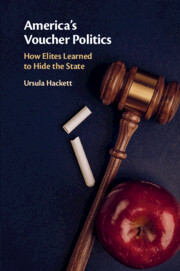Book contents
- America’s Voucher Politics
- America’s Voucher Politics
- Copyright page
- Contents
- Figures
- Tables
- Acknowledgments
- Abbreviations
- Introduction
- 1 America’s Foundational Identity Struggles
- 2 Two Dimensions of Attenuated Governance
- 3 The Racial Struggle
- 4 The Religious Struggle
- 5 The Public–Private Struggle
- 6 Tax Credit Scholarships in an Era of Republican Dominance
- 7 Education Savings Accounts and Controversies Beyond
- Conclusion
- Appendix
- References
- Index
4 - The Religious Struggle
Vouchers and the Church–State Question
Published online by Cambridge University Press: 20 April 2020
- America’s Voucher Politics
- America’s Voucher Politics
- Copyright page
- Contents
- Figures
- Tables
- Acknowledgments
- Abbreviations
- Introduction
- 1 America’s Foundational Identity Struggles
- 2 Two Dimensions of Attenuated Governance
- 3 The Racial Struggle
- 4 The Religious Struggle
- 5 The Public–Private Struggle
- 6 Tax Credit Scholarships in an Era of Republican Dominance
- 7 Education Savings Accounts and Controversies Beyond
- Conclusion
- Appendix
- References
- Index
Summary
Secularist forces in America’s religious struggle believe that church and state should be separated as completely as possible, while their accommodationist opponents believe the state should encourage religious activity. As the accommodationist order in America’s religious struggle gave way to secularist forces during the period of church–state activism by the Warren and Burger Courts (1953–86) on issues such as school prayer, evolution, and religious exemptions, accommodationists sought refuge in weakly attenuated voucher programs. This chapter shows how accommodationists came to rely upon a child benefit theory defense in court that emphasized the benefits to the child, rather than to the school. Accommodationists saw the rise of judicial secularism as a threat to their interests. Indirect benefits channeled through parents seemed to help insulate the state from secularist opposition. But most quasi-direct vouchers of the latter half of the twentieth century were struck down as unconstitutional because they entangled the state with religious purposes.
Keywords
- Type
- Chapter
- Information
- America's Voucher PoliticsHow Elites Learned to Hide the State, pp. 79 - 107Publisher: Cambridge University PressPrint publication year: 2020



